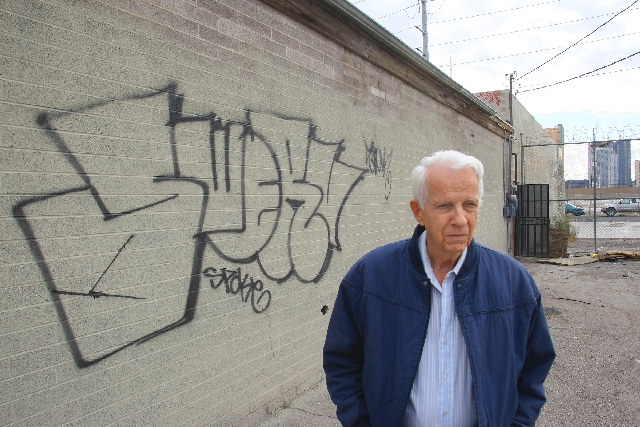‘Ted’ Marshall, a former district attorney, was a fiery pillar of early Las Vegas
As Edward Marshall lay dying in a Las Vegas hospice, the former prosecutor asked for a judge to release him from custody.
It wasn’t the first time.
In 1964, Marshall, then Clark County’s district attorney, was tossed in jail for refusing to pay a $25 contempt fine. It took a court order to free him.
He may be the only sitting district attorney to be jailed, albeit for only five hours.
It was just one highlight of a raucous four-year term that saw Marshall bring Oscar Goodman to Las Vegas, confront Sheriff Ralph Lamb and threaten to jail FBI agents for bugging casinos.
His term ended with his bar license suspended by the Supreme Court and a fistfight with one of his former prosecutors.
Marshall died April 13 after battling cancer for a year. He was 82.
Not long before his death, he recalled the fight with his former deputy Renny Ashelman.
Marshall lifted his atrophied right arm over the restraints of a medical gown. The man with thinning white hair and deep blue eyes grinned as he rolled his frail fist into a ball.
“I got him with this one,” he said.
WHIRLWIND OF TROUBLE
Marshall won the district attorney’s seat in 1962, defeating future Nevada Supreme Court Justice Myron Leavitt.
He promised to fight.
Immediately, Marshall found himself in a whirlwind of problems.
That year the FBI released a study calling Las Vegas the most dangerous city in the United States based on crimes per population size.
The tall, slender 32-year-old fired employees, revoked defense lawyers’ privilege of wandering around the DA’s offices and launched grand jury investigations of government officials.
He didn’t make many friends.
In 1964, Marshall announced he was taking on Las Vegas Justice of the Peace Tom Pursel, who was making $100,000 a year by charging extra fees to issue marriage licenses.
So Pursel held Marshall in contempt and fined him a minuscule sum; $25.
“I’m not about to pay five cents to satisfy Mr. Pursel’s hostility against me for calling the disgraceful JP system to the attention of the public,” Marshall told the Review-Journal in 1964.
To Marshall’s chagrin, Leavitt paid the fine for his political opponent. Marshall charged that Leavitt wanted to use the fine against him in a future race and declined to accept.
Eventually the contempt charge was dismissed.
Back at the hospice, Marshall was reminded of Leavitt’s move. He let out a cathartic laugh.
There were no hard feelings.
“Myron was a good man. He played the game according to the rules,” he said.
MORE CONFRONTATION
Marshall’s itch for confrontation didn’t end with Leavitt and Pursel.
He criticized popular Sheriff Ralph Lamb when his deputies fouled up a homicide scene where a man at the Thunderbird Hotel had been shot dead by his fellow workers.
Marshall demanded of Lamb to know whether the investigation was “deliberate malfeasance of duty by you and your officers or whether they are more in nature of nonfeasance and careless neglect.”
Lamb told the Review-Journal then that he would go see the district attorney about the problem, “as soon as he cools down.”
Marshall settled his issue with Lamb, but his temper was running hot.
He cemented his reputation when he responded to a prominent Las Vegas woman’s criticism of his office’s handling of another criminal case.
The letter Marshall wrote wasn’t diplomatic: “You can go right to hell, for all I care, thinking whatever you want to think of the District Attorney’s office and I couldn’t care less.”
GRAD NAMED GOODMAN
The same year he was jailed for contempt, Marshall hired a recent law school graduate from the East Coast named Oscar Goodman.
“I don’t think I was 23 years old,” Goodman recalled.
Marshall introduced the man who would become mayor, and his wife Carolyn, who also would become mayor, at a political dinner party.
Goodman worked as a clerk in the district attorney’s civil division while waiting to take the bar exam.
Goodman, a Jew, recalled having long, intellectual discussions about religion with his boss.
“He was a great mentor to me,” Goodman said. “He was the first LDS member (Mormon) I’d ever met.”
BOUNCED
By 1965, the Supreme Court had had enough of the fiery Marshall.
The county’s top prosecutor crossed a line when he chastised the justices for overturning a first-degree murder conviction.
He later apologized to the justices, but it was too late.
They suspended his license through July 1966, and without that credential, he couldn’t file for re-election.
Frozen out of one political race, Marshall took aim at Gov. Grant Sawyer, whom he viewed as soft on crime.
Marshall challenged Sawyer in a primary election, setting the stage for that historic fistfight with Ashelman, the former deputy, who had left the district attorney’s office to work on Sawyer’s campaign.
Three hours after Ashelman left the DA’s office, Marshall confronted his former employee over confidential files taken from his office.
Marshall claimed Sawyer had “bought” Ashelman and the files so they could be used against him in the election.
Marshall recalled the fight from his hospice bed:
“I took a swing with one and missed. I took another swing. On the third I connected.”
Marshall won that fight. The election against Sawyer was a different story.
He was clobbered.
POSITIVES
Marshall had an absence of fear, his children said.
“If something was wrong, he would stand up immediately to respond to it,” said his son George Marshall.
But he was also a cultured man who loved the arts and supported them through contributions to the University of Nevada, Las Vegas.
“He truly believed in service and education,” said his daughter, Tricia Lewis.
Marshall loved books, guns and classical music. He wrote several unpublished books himself, his children said.
“I never saw my dad without a book. It just didn’t happen,” Lewis recalled.
He would take a book to Sunday services and read at church, she said, and when she asked why she was not allowed to do the same, he told her, “I can read a book and listen and you can’t.”
After military service with the Marines, Edward Marshall made sure all of his children could shoot, Lewis said.
“While other kids were at the lake learning how to swim, we were oddly great marksmen,” she said.
And he held his children to a higher standard.
George Marshall recalled when his father, working as a Municipal Court judge, would reduce his friends’ speeding charges to parking tickets.
“He never did it for me. Not one time,” George Marshall said.
EARLY DAYS
Marshall was the son of Judge George Marshall and gained notoriety in town as an award winning orator for Las Vegas High School, where he won speech contests across the nation.
He graduated from Brigham Young University, and he served an LDS mission in Uruguay.
He married Luana Rushton of Salt Lake City and fathered seven children: Victoria Deaver, Ward Marshall, Tricia Lewis, George Marshall, Robert Marshall, Edward Marshall and Frances Marshall.
Luana, who suffered from multiple sclerosis but still led the March of Dimes charity for years, died young.
After her death, his children noticed their father’s absence.
“He was busy out there making a difference in the world,’’ Tricia Lewis said. “He wasn’t a homebody type of dad.”
After his forced retirement from elected office, Marshall entered private practice, and his name would show up in the newspapers sporadically.
Marshall criticized the findings of the Warren Commission’s report on President John F. Kennedy’s assassination.
He had once met Kennedy and admired him, Marshall said from his hospice bed.
He was suspended from the state bar in 1996 for mishandling a client’s trust fund, but the money was accounted for and the matter dropped.
A few years ago, he showed up before the Las Vegas City Council, which was at that time led by his former protege, Oscar Goodman.
The former mayor recalled Marshall complaining about a graffiti problem.
Unsatisfied by the council’s response, Marshall told the members to “shove it,” Goodman said.
On Tuesday, Goodman was saddened to find Marshall’s obituary in the newspaper.
“He gave me my chance to make Las Vegas my home,” Goodman said as he recalled the furious 1960s.
“It was a different town with strong people.”
Marshall was one of them, he said.
Goodman acknowledged that not everyone viewed Marshall as he did, as a friend.
“They either thought he was a genius or a nut,” he said.
“Maybe that’s not a bad way to be thought of.”
Contact reporter Francis McCabe at
fmccabe@reviewjournal.com or 702-380-1039.

















